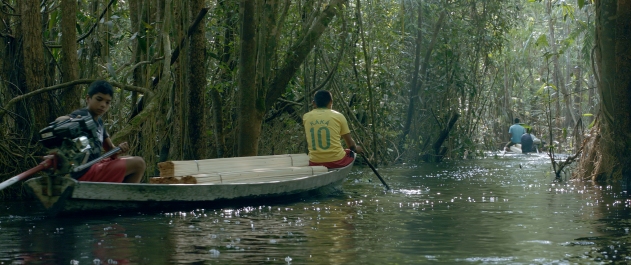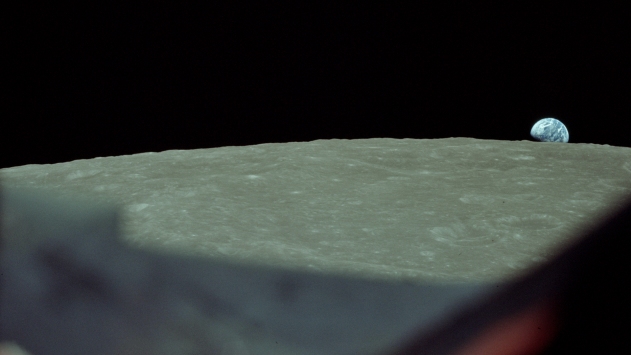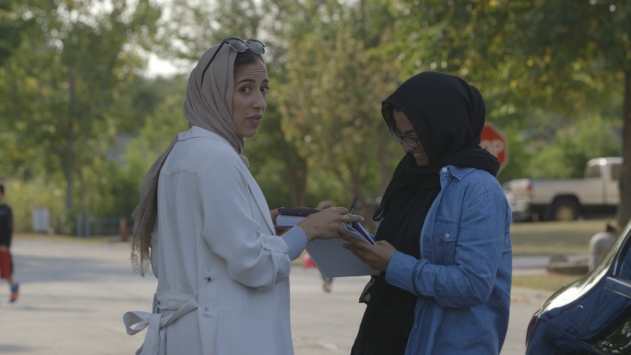
The Camden International Film Festival (CIFF) is one of the premiere documentary film festivals, now in its 14th year. It will take place from September 13 through 16 in Camden, Rockport, and Rockland, Maine. While the festival is not organized thematically, there are a number of science and technology-related films that are featured each year. Before the start of this year’s festival, we spoke with programmer Sean Flynn. Flynn is also the director of Storyforms, CIFF’s showcase of immersive and interactive media.
Science & Film: Do you think consciously about programming science-related films, or has that emerged organically?
Sean Flynn: We never go into the programming process thinking that there are specific themes that we want to bring to the festival. It is an emergent process of seeing what’s out there, and there is a little bit of matchmaking between the films that we discover in the programming process and what we know our audience is interested in. We are a festival based in a rural town that has a big focus on conservation. There is a constellation of organizations in this area that are doing science education and research; it’s part of the fabric of this community. The majority of our audience is local, and I think we draw from a pretty broad cross-section of the local community. I think there are some shared values that cut across all of those communities, and one of them is a sense of place, a sense that this place is worth preserving and not overdeveloping. A theme that has run through almost every festival we’ve had is the environment. We have fewer environmentalist films this year, although we do have a few pieces in the Storyforms program that touch on those themes.
I think it is an important time for documentary storytellers to find new ways of communicating science themes, given the political climate and erosion of trust in the institutions of science. I am always fascinated by films that can give you a new appreciation of science, even if you’re not a scientist.

S&F: You said you have fewer environmentalist films this year. Can you expand a bit on the kinds of science films you’re interested in as a programmer?
SF: I’m sure everybody has their own definition of science, but to me it’s about trying to understand nature through observation, recognition of patterns, and ultimately through constructing a story of how the world that we inhabit came to be. I think that there are a lot of parallels with documentary film. We are generally not showing a lot of films that are explicit advocacy pieces, but we do feel strongly that we want people to find their own sense of connection to the natural world and that film is a great way to do that. I think a great example of that is a film that we’re screening as part of the Storyforms program called WALDEN.
WALDEN is by a Swiss filmmaker, Daniel Zimmermann. It premiered at the Karlovy Vary Film Festival earlier this year. The entire film is 13 shots, and they’re all 360-degree pans from left to right. They follow a tree that is being felled in a forest in Austria that is then transported to Brazil. So you get a very visceral, experiential film. It’s meditative, it’s transportive, and I think leaves space to think about things like resource extraction, what a globalized economy looks like, and the flow of these natural resources like trees that are part of a larger ecosystem of commodity trading. So you see the intersection of the industrial world and the natural world. I would say that’s probably the closest thing we have to an environmental film in the festival.
S&F: I’ve seen the film and it’s challenging, but builds into a rhythm.
SF: Yeah. It challenges you to get to a more attentive state than you might be in a traditional, formulaic, feature-length film.
S&F: How will you be presenting WALDEN?
SF: WALDEN is part of Storyforms this year. Storyforms is our immersive media program, and most of the work in the program is virtual reality right although we have one augmented reality piece this year. This is the third year of that program, and we’ve always had a projection piece. For WALDEN, we are building a sixteen-foot screen inside a barn in Rockland, Maine. Part of that barn space will be for VR and AR work, and then another side of it will be this large-scale projection of WALDEN which is just a tip of the hat to the kind of formal construction of the film—using a traditional sort screen-based media to achieve the same levels of immersion as 360 storytelling.

S&F: You’ve curated Storyforms for three years. How have you seen science-related VR or AR work change?
SF: There is a handful of subgenres of AR or VR that I’ve noticed, and certainly science and climate based storytelling is one of those. Another project that is worth mentioning is a project called SANCTUARIES OF SILENCE. It is about an acoustic ecologist named Gordon Hempton who has spent most of his life documenting noise pollution and going into the rainforest in Washington—the quietest place in the 48 states—and documenting the encroaching industrial noise pollution. The sound in that piece is really gorgeous. It is another piece that puts you into a different relationship with the natural world, and makes you think about your sensory experience of sound on a daily basis. It is a pretty straightforward 360 video piece, but we are building an installation around it. The filmmaker’s name is Emmanuel Vaughan-Lee and he’s also at the festival with a short film called EARTH RISE, which is a really beautiful thirty-minute film about astronauts looking back at Earth.
S&F: In terms of the technology-related films in the program, at least two of them—THE FEELING OF BEING WATCHED and THE TRUTH ABOUT KILLER ROBOTS—seem like ominous or at least skeptical stories of technology. Could you talk a little bit about those films, and how they fit into the program?
SF: THE FEELING OF BEING WATCHED was a project that was pitched as part of our Points North Fellowship a few years ago, and the director Assia Boundaoui ended up winning the award for Best Pitch that year. So it is a project that we got behind as an organization and have been proud to see what she’s done with it and since coming through the pitch program. [For the film,] Assia was able to sue the FBI and get the release of 40,000 documents related to decades of surveillance of her community in the suburbs of Chicago. As a society, we have only been talking about surveillance seriously since Edward Snowden, and in the context of digital surveillance, technology, and social media. But communities of color—black, Muslim communities—have been subjects of government surveillance for generations at this point. What THE FEELING OF BEING WATCHED interrogates is going back into the ’80s and ’90s when surveillance was analog in nature; agents were around asking lots of questions, wiretapping, things like that. Really a an ongoing program that was constructed in order to create this kind of Panopticon affect that ensures that these citizens—American citizens—are always feeling as though there is somebody looking over their shoulder. The film is an interesting mix of investigative journalism and personal documentary, because so much of it is about her and her family and the environment that she grew up in.

The other film you mentioned is THE TRUTH ABOUT KILLER ROBOTS which is the latest film from Maxim Pozdorovkin, who made OUR NEW PRESIDENT. It is a great tour through the current science and some of the real world implications of AI and robotics. The title is a play on the anxiety we’ve had about automation and computation for generations: this idea of killer robots, or of robots displacing us. The film starts with the story of a worker in a Volkswagen factory in Germany who was killed by one of the robotic arms on the assembly line. One of the original principles for robotics that Isaac Asimov said was that robots should be programmed so that they can do no harm to humans. We’ve already seen in these very early days of AI several deaths that have resulted. So Max touches on those, but the film also has a lot of lighthearted elements and looks across the spectrum at ways people are experimenting with this technology how our social and economic world might change as a result of it.
S&F: There is so much skepticism about technology now. I sometimes wonder if that is generational; like, what happened to THE JETSONS?
SF: Yeah, totally. There is the question today of who is benefiting from this? There are fantasies of an automated world where automation frees up more leisure time for everybody, but I think those have pretty much fully eroded by now. I think those came about at a time when there was broad-based economic growth and a sense that more leisure was in everybody’s future because it was just going to be about putting these machines to work. But I think we’re far enough down the road and there is enough economic anxiety already in the world that people are really questioning the motives behind the development of these technologies. THE TRUTH ABOUT KILLER ROBOTS is done in a way that is not too heavy-handed and definitely leaves a space to think and debate about what those futures might be.
S&F: It sounds like a fantastic program. Will some of the filmmakers be present?
SF: Yeah, a huge number. I think most of the features will have the directors in attendance and I would say at least half of the shorts as well. We also have more than thirty filmmakers with projects in development coming, with some environmental stories in there as well. It’s going to be a convergence of the doc community; we’re really excited about it.
The Camden International Film Festival runs from September 13 through 16 in Camden, Rockport, and Rockland, Maine. Sean Flynn is Program Director of Storyforms and Director of the Points North program at CIFF, which includes year-round support for artists developing their films.
In addition to the films mentioned in this interview, science-related films in this year’s lineup include Darren Foster’s Sundance-winning documentary SCIENCE FAIR (in theaters September 14), Mindaugas Survila’s THE ANCIENT WOODS (we spoke with the filmmaker), and Lana Wilson’s series THE CURE FOR FEAR.
TOPICS